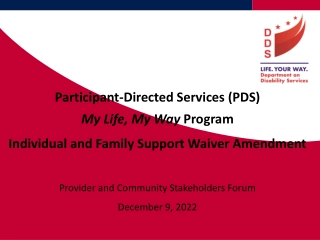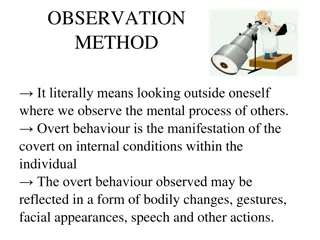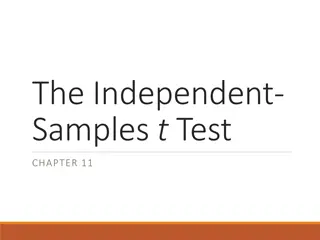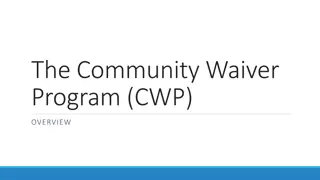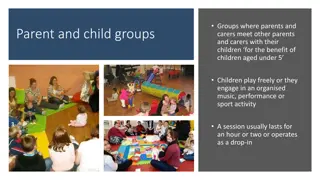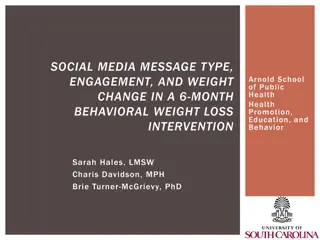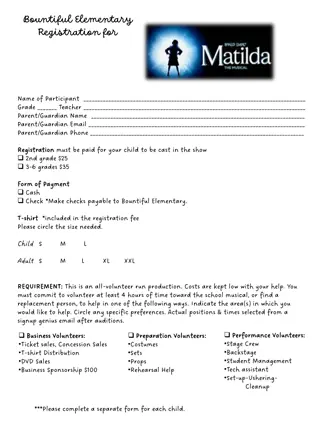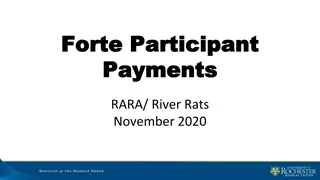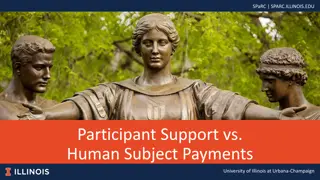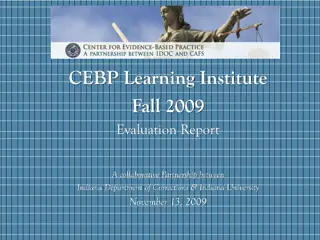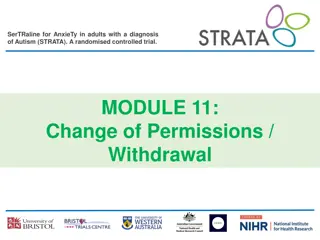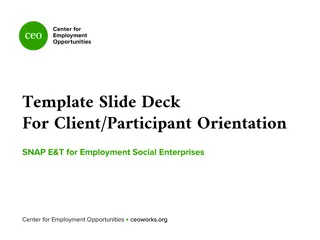Participant-Directed Services (PDS)
The new service option, Participant-Directed Services (PDS), in the Individual and Family Support (IFS) Waiver. PDS offers district residents enrolled in the IFS Waiver the opportunity to have more choice, control, and flexibility over the services they receive, allowing them to live in their natura
1 views • 20 slides
Types of groups and reactions
This information discusses electron-donating groups (EDGs) and electron-withdrawing groups (EWGs), their effects on molecule reactivity, examples of each group, nucleophiles, and electrophiles. EDGs increase electron density, making nucleophiles stronger, while EWGs decrease electron density, making
0 views • 14 slides
Comprehensive Guide to Workshop Organization and Implementation
Workshops play a crucial role in developing psychomotor skills and practical knowledge in education. Defined as a group of individuals meeting to enhance skills through study, research, and practice, workshops involve active participant involvement and focus on practical experiences. Essential featu
1 views • 15 slides
Class Groups Are They the Future of Collaborative Learning
The traditional classroom setting, with rows of students facing a teacher at the front, has dominated education for centuries. However, the rise of technology and the evolving needs of the 21st century workforce are pushing the boundaries of learning. Enter Class Groups, a concept that reimagines th
4 views • 3 slides
Understanding Functional Groups in Organic Chemistry
Functional groups in organic chemistry are specific groups of atoms within molecules that determine the chemical properties of the compound. This content provides visual representations and descriptions of various functional groups such as alkanes, alkenes, alcohols, aldehydes, acids, and esters. Le
0 views • 38 slides
Guideline for Statin Management in High-Risk Groups - 2018 ACC/AHA
This guideline outlines the management of blood cholesterol in high-risk groups according to the 2018 ACC/AHA recommendations. It discusses the overall approach, different statin management groups, justification for statin use in high-risk populations, high and moderate-intensity statin therapy, and
1 views • 14 slides
Enhancing Recruitment and Retention Strategies in Research Settings
This content delves into the challenges and approaches in recruitment and retention processes for research studies. It covers topics such as review of recruitment tools, engagement in discussions on effective practices, utilization of mass mailings and social media for participant recruitment, and m
2 views • 19 slides
Understanding Interest Groups in Texas
Explore the role and influence of interest groups in Texas politics, including theories, types of groups, activities, and the impact of lobbying. Learn about incentives for joining, the free rider problem, and the various benefits interest groups offer. Discover the different types of interest group
0 views • 15 slides
Understanding Observation as a Data Collection Tool in Behavioral Science
Observation method serves as a crucial tool for data collection in behavioral science, enabling researchers to systematically record and analyze observable phenomena. This method involves recording behavior patterns without direct interaction, providing in-depth insights into natural settings and in
0 views • 12 slides
Understanding the Role of Interest Groups in Politics
Interest groups are organizations with shared policy goals that influence the policy process. They differ from political parties as they focus on specific policies. Theories of interest group politics include pluralist, elite, and hyperpluralist perspectives. Hyperpluralism suggests that groups beco
0 views • 22 slides
Understanding Research Ethics: Principles and Application
Research ethics play a crucial role in safeguarding the rights of individuals involved in research activities and maintaining the integrity of the scientific process. This presentation covers the fundamental principles of research ethics - respect for persons, beneficence, and justice - along with p
0 views • 10 slides
Understanding Chemical Groups and Macromolecules in Biological Processes
In biological processes, certain chemical groups play crucial roles in molecular functions. These functional groups, including hydroxyl, carbonyl, carboxyl, amino, sulfhydryl, phosphate, and methyl, are essential for the structure and function of biological molecules. Additionally, macromolecules, s
0 views • 9 slides
Understanding Observation Methods in Psychology
Observation method in psychology involves looking outside oneself to observe the mental processes of others. It includes types such as participant and non-participant observation, structured and unstructured observation. Steps in the process include planning, execution, interpretation, and reporting
2 views • 10 slides
Understanding Independent Samples t-Test in Statistical Analysis
The independent samples t-test is used to compare means in a between-groups design where each participant is in only one condition. It involves sets of participant scores that are independent, meaning they are completely unrelated to each other. This test helps to determine if there is a significant
1 views • 32 slides
Overview of the Community Waiver Program (CWP) and Enrollment Groups
The Community Waiver Program (CWP) aims to support full participation in communities, preserve natural living arrangements, and reduce waiting lists by offering targeted services to different enrollment groups. The program includes three authorities: 1915(c) Waiver, 1915(i) State Plan Amendment, and
0 views • 58 slides
Important Changes and Guidelines in Year 4 Program
In Year 4, significant changes have been made to the counting of participant contact hours, with a focus on the WIOA methodology and maintaining participant status. The emphasis is on the period of participation within the TEAMS framework, with orientation hours being distinct from direct contact ho
2 views • 29 slides
Guidelines for Parent and Child Groups Under 5 Years Old
Parent and child groups for children under 5 provide a space for families to connect while children play freely or participate in structured activities. Sessions last for an hour or two with a maximum of 30 attendees. Indoor singing is limited to 6 adults, with good ventilation, while outdoor singin
2 views • 5 slides
Representation of Abstract Groups through Graphs
Explore the representation of abstract groups as automorphism groups of graphs, touching on topics such as the existence of graphs whose automorphism groups are isomorphic to given abstract groups, the cardinality of connected graphs satisfying specific properties, and questions regarding the cardin
0 views • 16 slides
Practical Approach to Using Groups and Teams in Classroom Settings
This workshop focuses on utilizing groups and teams in educational environments, providing techniques to form diverse and effective groups, outlining key principles, exploring low and high-risk activities, discussing different forms of peer assessment, and addressing challenges associated with group
0 views • 27 slides
Managing Participant Support Costs for Undergraduate Research Experiences (REU)
Participant support costs for REU programs include stipends, travel allowances, and registration fees for non-employee participants. The Uniform Guidance outlines guidelines for allowable costs, while NSF provides stipend guidelines. Institutions like Brown University have specific procedures for st
0 views • 6 slides
Insights into Labour and Birth Among Marginalized Groups and Migrant Women
This content discusses new insights into socio-cultural phenomena surrounding labour and birth, particularly focusing on marginalized groups and migrant women. It includes details on sub-working groups, updates, and plans within this topic area, such as experiences of labour and birth, optimizing ch
0 views • 22 slides
Impact of Social Media Message Types on Participant Engagement in a 6-Month Behavioral Weight Loss Intervention
This study explores whether different types of social network messages influence participant engagement and how engagement with social media affects weight loss outcomes in a 6-month behavioral weight loss intervention. The intervention includes orientation sessions, diet information, recipe books,
0 views • 22 slides
Understanding Organic Chemistry: Functional Groups and Naming Rules
Delve into the world of organic chemistry with a focus on functional groups like alcohols, ethers, aldehydes, and ketones. Explore the rules for naming these compounds, understanding their structures, and how they impact the properties of molecules. From alcohols with hydroxy groups to ketones conta
0 views • 21 slides
Enhancing Participant Experience at Gliding Club Workshop
Explore the participant experience at a gliding club workshop through activities, personas, and journey mapping. Identify pain points and best practices to ensure a great day for all involved. Meet various participants like Sally Spinbetter and understand their activities, interactions, and recommen
0 views • 11 slides
Bountiful Elementary Musical Registration Information
Registration details for the Bountiful Elementary school musical, including participant information, payment options, volunteer requirements, and character descriptions. Parents/guardians need to fill out separate forms for each child, specify T-shirt sizes, and commit to volunteering for a minimum
0 views • 6 slides
Understanding Pressure Groups and Their Influence on Decision-Making
Pressure groups are formed by like-minded individuals to influence decision-makers by drawing attention to specific issues, with the aim of impacting legislation and existing laws. People join pressure groups seeking to address particular issues more effectively than through mainstream politics. Whi
0 views • 25 slides
Transitioning to Forte Participant Payments for Clinical Research
Transition from Bank of America to Forte Participant Payments managed by CTSI Office of Clinical Research. Efficient payment methods like debit card, direct deposit, and checks available. Training for Study Coordinators and Finance roles provided. Access system easily via online setup.
0 views • 8 slides
Attendance Tracking for Heads Up Program in Uganda
This document provides a structured format for tracking participant attendance at the Heads Up Program in Uganda. The form includes sections for participant names, activity dates, and checkboxes to mark attendance. It aims to monitor the participation of women, adolescent girls, and young men in var
0 views • 15 slides
Introducing Poll Everywhere for Interactive Audience Engagement
Easily engage your audience with Poll Everywhere using these steps for seamless activity preparation, presentation, and participant involvement. Learn how to create and test activities, customize instructional scripts, and provide clear guidelines for responsive web and SMS voting. Utilize presentat
0 views • 8 slides
Expert Consultation Meeting Milestones and Activities Summary
In preparation for the expert consultation meeting, various activities such as internal meetings, invitation coordination, formal invitation letters, RSVP management, participant arrival logistics, and quarterly reporting were meticulously planned and executed. Key milestones included finalizing TOR
0 views • 9 slides
Participant Rights and Responsibilities Guidance
Ensure every participant understands their rights and responsibilities by providing and explaining the Rights and Responsibilities form. Offer forms in multiple languages and verbally review key points on the form to build trust. Encourage questions and discussions to clarify any confusion.
0 views • 8 slides
Understanding Participant Support and Human Subject Payments at University of Illinois
Definitions and details regarding Participant Support Costs (PSC) and Human Subject Payments at the University of Illinois at Urbana-Champaign, including examples of expenses covered, charging mechanisms, and account codes. Learn about the differences between support for participants and remuneratio
0 views • 14 slides
CEBP Learning Institute Fall 2009 Evaluation Report
Evaluation report of the Fall 2009 CEBP Learning Institute, a collaborative partnership between Indiana Department of Corrections and Indiana University. The report highlights the goal of providing community corrections officials with tools to implement evidence-based practices. It includes feature
0 views • 18 slides
Ethical Aspects of Informed Consent in Clinical Trials
Understanding the ethical foundation of informed consent in clinical trials is crucial for ensuring participant protection, autonomy, and decision-making. Key historical milestones and guidelines have shaped the requirements for obtaining informed consent, emphasizing the importance of voluntary par
0 views • 18 slides
Student Interest Group Policy Changes Overview
Student Interest Group Policy Changes involve implementing new criteria for student interest groups, setting membership requirements for preclinical and clinical years, consolidating existing groups, and establishing new interest groups. The policy includes guidelines on events, fundraisers, faculty
0 views • 9 slides
Managing Participant Withdrawal in Autism Study: Key Procedures
This training module details important procedures for withdrawing participants from medication and questionnaires in a study focused on treating anxiety in adults with autism. Participants are allowed to withdraw for any reason at any time, with recommended guidance on medication discontinuation and
0 views • 29 slides
Financial Management Update Meeting Highlights
Today's agenda at the SPA/SPAC update meeting covered various financial services updates, including revisions to participant payment procedures, year-end updates, joint updates, reorganizations, recent agency issues, and more. Focus was also on study participant payment procedures, FY16 year-end dea
0 views • 41 slides
IEEE 802 LMSC 135th Plenary Session - Participant Guidelines and Ethics
Participant behavior in IEEE-SA activities is guided by the IEEE Codes of Ethics and Conduct, emphasizing integrity, responsible behavior, fair treatment, and independent decision-making. Adherence to these principles is essential in ensuring a balanced and inclusive standards development process.
0 views • 30 slides
Understanding Cyclic Groups and Discrete Logarithms
Exploring the concepts of cyclic groups and discrete logarithms in group theory. This presentation covers the definition of generators, examples of cyclic groups, important theorems related to prime orders and cyclic groups, uniform sampling in cyclic groups, and the discrete logarithm problem. Exam
0 views • 14 slides
Client/Participant Orientation for ESE Employment Social Enterprises
Guide and template for developing orientation materials for participants in SNAP E&T programs at the Center for Employment Opportunities. Includes information on program goals, components, enrollment process, and participant rights. Utilize this presentation to enhance client understanding of ESE se
0 views • 17 slides
